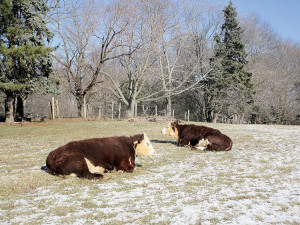By Joseph Sapia
In an effort to bring attention to the farming in Monmouth County, the county government is kicking off a “Grown in Monmouth” promotion of farm products.
Farmers and farm-related business owners are invited to the first “Grown in Monmouth” meeting at 7 p.m. Tuesday, Jan. 26, at the Rutgers University Research Center, 283 Route 539, in Upper Freehold.
“We need more marketing of American produce,” said Monmouth County Agricultural Agent William J. Sciarappa. “We’re getting overwhelmed with imports – Mexico, South America, Europe.”
The county is hoping farmers – along with large consumers of food such as restaurants and schools, online money-lenders in Sweden, municipal officials and other interested – show up.
“We have some of the best produce in the world right here in Monmouth County and endorsing these products on a larger scale is long overdue,” said Lillian G. Burry, a member of the county Board of Freeholders and its farming liaison.
“An important part of this project will be to conduct research to gain a comprehensive understanding of not only the needs of the county’s agricultural industry, but also the needs of local and regional buyers in order to develop a strategy to foster successful business relationships,” said Freeholder Director Thomas A. Arnone.
At the meeting, those involved will explain the idea of the program, seek feedback from attendees and distribute a survey – gathering information on what farmers are producing and related data, along with who is willing to participate in the program, said John Ciufo, Economic Development’s executive director.

The county says it also wants to learn how the home-grown products are distributed and the challenges of distribution, then following up by developing strategies to overcome the challenges.
Longer-term goals would include marketing county-grown items, according to the county. The program would not interfere with county-grown products being sold out of county, said Laura Kirkpatrick, director of the county Department of Public Information and Tourism.
For now, farmers are waiting for the meeting to hear what is said.
“I’ve got to find out a little bit more about it,” said William Potter III of the W.H. Potter and Son farm and home and garden center on Red Hill Road in Holmdel.
Potter said he plans to attend the meeting because he is a farmer – who raises cows, sheep and goats and because he is on the county Agriculture Development Board, of which he is chairman.
Grown in Monmouth is an idea originated in county government and began taking shape about 18 months ago, Ciufo said. The county took the idea to the federal Department of Agriculture and was awarded an $80,000 Rural Business Enterprise Grant in November.
With another $80,000 of in-kind services, the Grown in Monmouth initiative is beginning, the latest program of Grow Monmouth.
“This is another way the county aims to help local and small businesses,” Arnone said.
Grown in Monmouth will be a joint project of the freeholders, Economic Development, Public Information and Tourism, county Division of Planning, and the Rutgers University Cooperative Extension.
Grow Monmouth dates back about six years, Arnone said. It is “an initiative of going to and giving information to municipalities, chambers of commerce, to know the county is behind economic development,” Arnone said.
“Not only to bring business in, but retention (of business) in the county,” Arnone said.
One of Grow Monmouth’s programs dates back to 2012: Made in Monmouth is a free event at Monmouth University for local vendors to sell products – such as food, furniture, jewelry, and clothes – manufactured in the county. About 2,500 people have visited each event and more than 200 sellers are expected at this year’s event on April 9, according to county officials.
Grown in Monmouth has hired Spinelli and Pinto Consulting of Chester – in a contract not to exceed $68,173 – to analyze Monmouth County farming, Arnone said. An initial study should be wrapped up in a year, Ciufo said.
The county also has been developing a logo for Grown in Monmouth.
“We want to brand this,” Ciufo said.
The grant’s focus will be on 13 county municipalities considered all or partly rural by the federal agriculture department: Allentown, Colts Neck, Englishtown, Farmingdale, Freehold Township, Holmdel, Howell, Manalapan, Marlboro, Millstone, Roosevelt, Upper Freehold and Wall. But county officials emphasized all 53 county municipalities are welcome to take advantage of the program.
Although the program applies to all-Monmouth grown, it likely has more practical application to “high-value, human food crops, Christmas trees, and nursery stock,” Sciarappa said. Field crops, such as soybeans and feed corn, normally do not go directly to the consumer.
Some farmers may have farm markets and have websites to connect directly to consumers, but they may not be able to afford advertising, he said. “It’s mostly word-of-mouth. So, we’re just trying to get the promotion out for Monmouth-grown.”
The county consistently ranks in the top 3 of New Jersey’s 21 counties in agricultural production, Sciarappa said. He added the county has another thing going for it.
“We’re the most diverse (growing) county in New Jersey,” Sciarappa said. “We grow everything from asparagus to zucchini.”
“The agricultural groups are very excited about (now) being recognized,” Burry said. “They feel they may be somewhat overlooked.”
“If we could make this successful, this could spread,” Sciarappa said. “The more brains get involved, we could really create a template for the whole state.”
There is no pre-registration for the meeting, but more information is available from the county Division of Economic Development by calling 732-431-7470.














